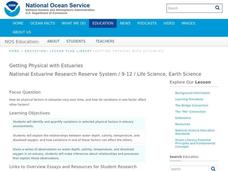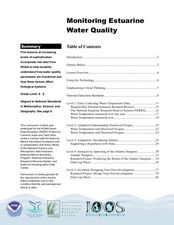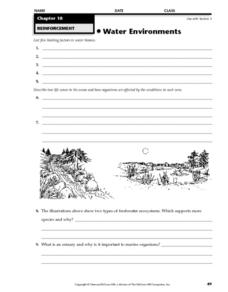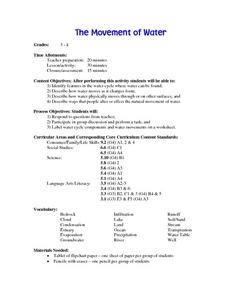Curated OER
Biodiversity in an Estuary
Learners investigate the biodiversity in estuaries. In this estuary lesson plan, students use Google Earth to explore the Rookery Bay National Estuarine Research Reserve. They produce a biodiversity concept map and portray the life of a...
Curated OER
A Model Estuary
Students assemble a poster of an estuary showing the five communities of animals and plants that inhabit the estuary. They research the concept of an estuary and find photographs or diagrams of various estuaries to identify and see the...
Curated OER
Estuaries, Estuarine Habitats, and Adaptations
Students conduct research on estuaries. They design and construct an estuary, describe the physical characteristics of an estuary, and create a diagram illustrating an estuarine food web.
Curated OER
Plants and Animals of Great Bay Animals and Plants of the Estuary
Students participate in a webquest about the plants and animals that inhabit an estuary. They role play as environmentalists researching this habitat and present the results of their research in a creative way.
Curated OER
Getting Physical with Estuaries
Students study estuaries and how the physical factors change over time. In this investigative lesson students use a website to gain knowledge of estuaries then in groups they create and present their charts.
Curated OER
The Hudson's Ups and Downs
Fifth graders practice interpreting line graphs of the Hudson River water levels to assess the tides and tidal cycles in the estuary. They explore how weather can affect water levels and tides and observe that high tides and low tides...
Curated OER
Monitoring Estuarine Water Quality
Learners analyze water quality data from real data. In this environmental science activity, students examine how salinity and dissolved oxygen affect the living organisms in the estuary. They interpret graphs to support or disprove a...
Curated OER
What is an Estuary?
Students define the terms estuary and watershed. They conduct an experiment to determine the density differences between fresh and saltwater. They examine the salinity distribution of the Peconic Bay Estuary.
Curated OER
Dining Out With Fishes and Birds of the Hudson
The class will make observations to determine how environment has shaped the way particular birds and fish eat. They will view a series of photographs, read two short articles, and then consider how food availability has determined how...
Curated OER
Writing About Estuaries
Students use the internet to research an aspect of interest to them about the Tijuana Estuary. After the unit on the estuary is completed, they reflect on their experiments and thoughts in a paper. They also participate in a field trip...
Curated OER
Introduction to the Barnegat Bay Estuary
Students research estuaries. In this estuaries lesson, students discuss the differences in a bay and an ocean. Students watch a PowerPoint of the properties of the estuaries and geography of Barnegat Bay. Students complete a worksheet...
Curated OER
What the Tijuana Estuary Does For You
Students discover what the estuaries do for the environment. In pairs, they create an advertising campaign to educate others in their local area about the benefits of estuaries. They share their poster with the class and possibly the...
Curated OER
Beaches of the Delaware Estuary
Students examine estuaries in Delaware. They, in groups, gather samples of water to find organisms and identify them.
Prince William Network
Migration Headache
During this game, kids become migratory shorebirds and fly among wintering, nesting, and stopover habitats. If they do not arrive at a suitable habitat on time, they do not survive. Catastrophic events are periodically introduced that...
Curated OER
Exploring Ecosystems
Students examine the relationships between plants, animals, and the environment in ecosystems. They sort animal cards, collect natural materials from the schoolyard, and record an ecosystem web in the form of a poster.
Curated OER
Water Environments
In this water environments worksheet, students will brainstorm limiting factors in water biomes, describe the two life zones in the ocean, and compare two types of freshwater ecosystems. This worksheet has 9 short answer questions.
Curated OER
Understanding Estuaries
Young scholars work together to develop their own estuarine ecosystem in an aquarium. They observe the aquarium daily and record them in a notebook. They discuss the different interactions they see with the class.
Curated OER
Fish Communities in the Hudson
Learning to read data tables is an important skill. Use this resource for your third, fourth, or fifth graders. Learners will will study tables of fish collection data to draw conclusions. The data is based on fish environments in the...
Curated OER
The Movement of Water
Here is an excellent lesson plan on the water cycle and the states in which water exists. Learners identify the features of the water cycle, describe how water changes form, and look at ways that people affect the natural movement of...
Curated OER
Creative Problem Solving
Students respond to a situation presented about the wetlands. In this wetlands lesson plan, students understand the various opinions over the use of areas in the wetlands. Students complete a worksheet using critical thinking questions...
Georgia Aquarium
The Ocean's Nursery
Linear perspective, estuaries, and water ways converge in a science-inspired art project. The class uses what they've learned about eco-systems, estuaries, and the food chain to create scale models of a local marsh. While the...
Curated OER
Tracking the Salt Front
Using the Hudson River as the focus, learners discuss the difference between salt water and fresh water environments, analyze maps and graphs, and complete addition and subtraction problems. This lesson comes with a wealth of...
Curated OER
Plankton in the Air
Here is a lab activity adequate for use with any full lesson on environmental factors that shape animal adaptations or marine animal characteristics. Pupils will discuss the role plankton plays in the environment and filter-feeding...
Curated OER
Finding the Salt Front
Learners discuss definitions of estuary, salinity, and the salt front. They listen as the teacher explains the Hudson River Miles and ways the upriver and downriver sections relate to the north and south. Students graph the salt front...

























